Makunda Christian Hospital
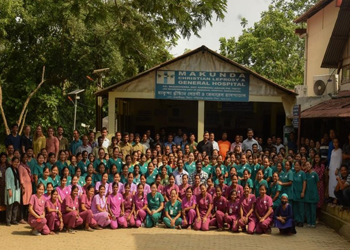
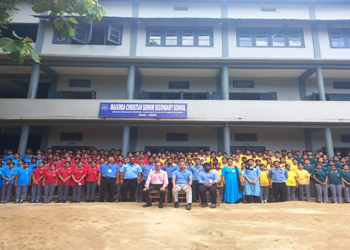
With a staff of nearly 500 including 22 doctors and 155 nurses, Makunda Christian Hospital cares for 130,000 outpatients and 13,400 inpatients, perform 10,000 surgeries, and deliver 6,300 babies each year.
They offer quite a few medical specialties, including laparoscopic surgery, neurophysiology, and psychiatry.
Their community health and development program is robust and varied. They run health clinics (including mental health and prenatal care), palliative care, and training in income-generating activities, such as mushroom growing.
The hospital campus also includes Makunda Christian Secondary School which goes through 12th grade. Most of the students are poor children from the nearby tribal communities. It opened in 2004 and has educated 1,300 students so far.
Regaining Mobility and Independence
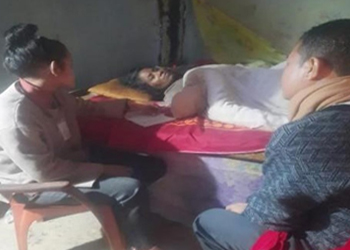
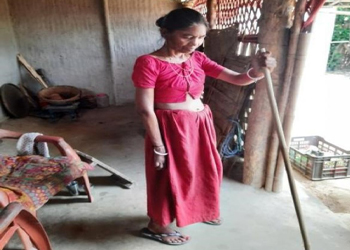
When the Makunda Christian Hospital community team came upon Sarita, she had been bedridden from a stroke for some time. Dependent upon others, Sarita was miserable and hopeless.
The team brought her to the hospital, treated her, and began rehabilitation. Over time, Sarita’s body grew stronger and she was able to stand up on her own.
When the day came that she was able to walk unsupported, the entire team rejoiced. Sarita soon went home, able to care for herself and undertake her own tasks. Sarita was extremely thankful to the Makunda team for helping her to get her mobility and independence back.
Read About the Makunda Model for Mission Hospitals
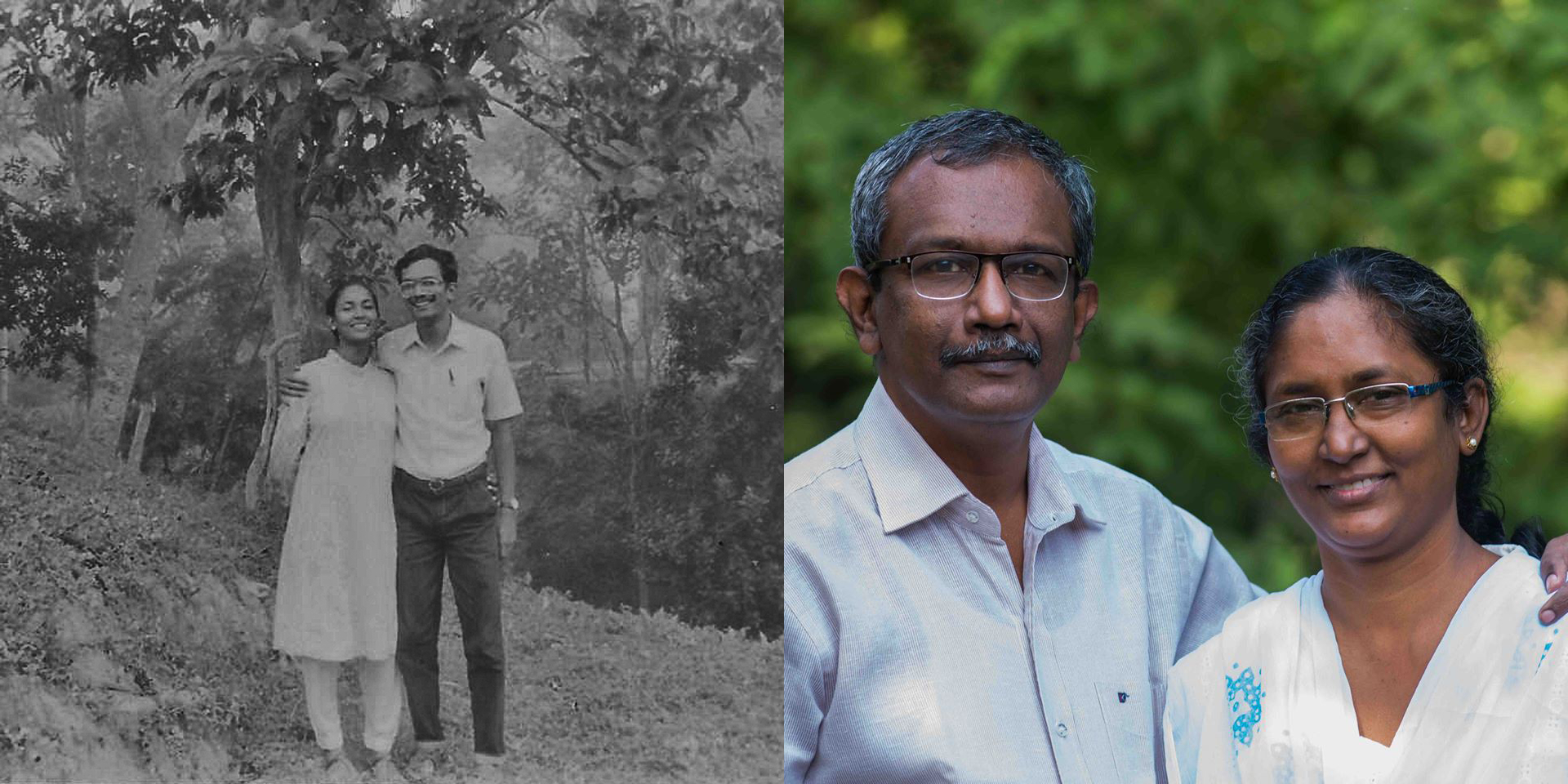
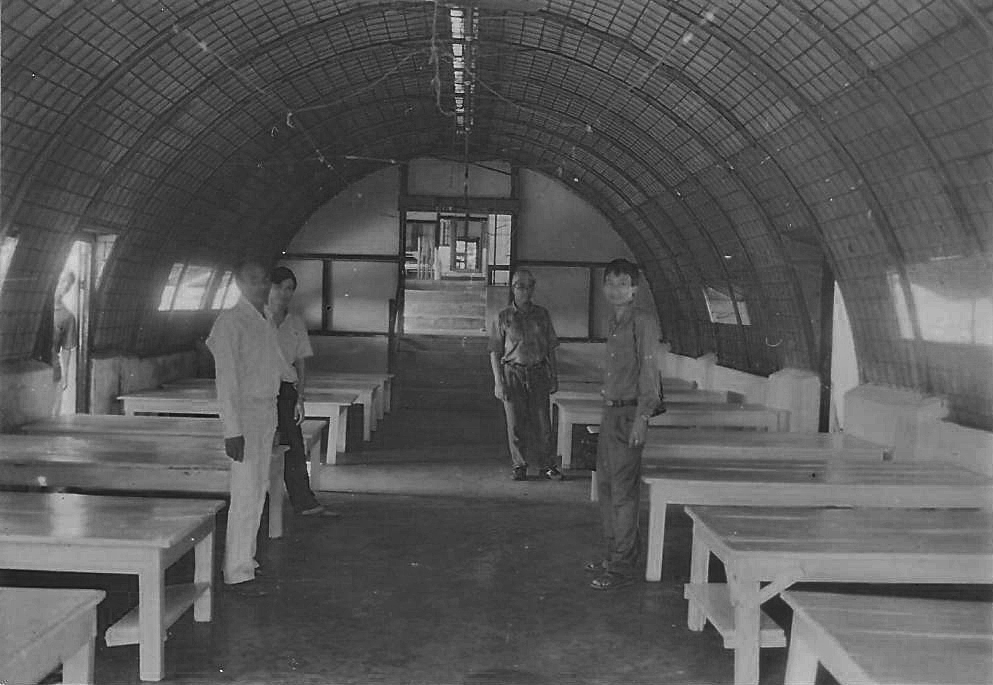
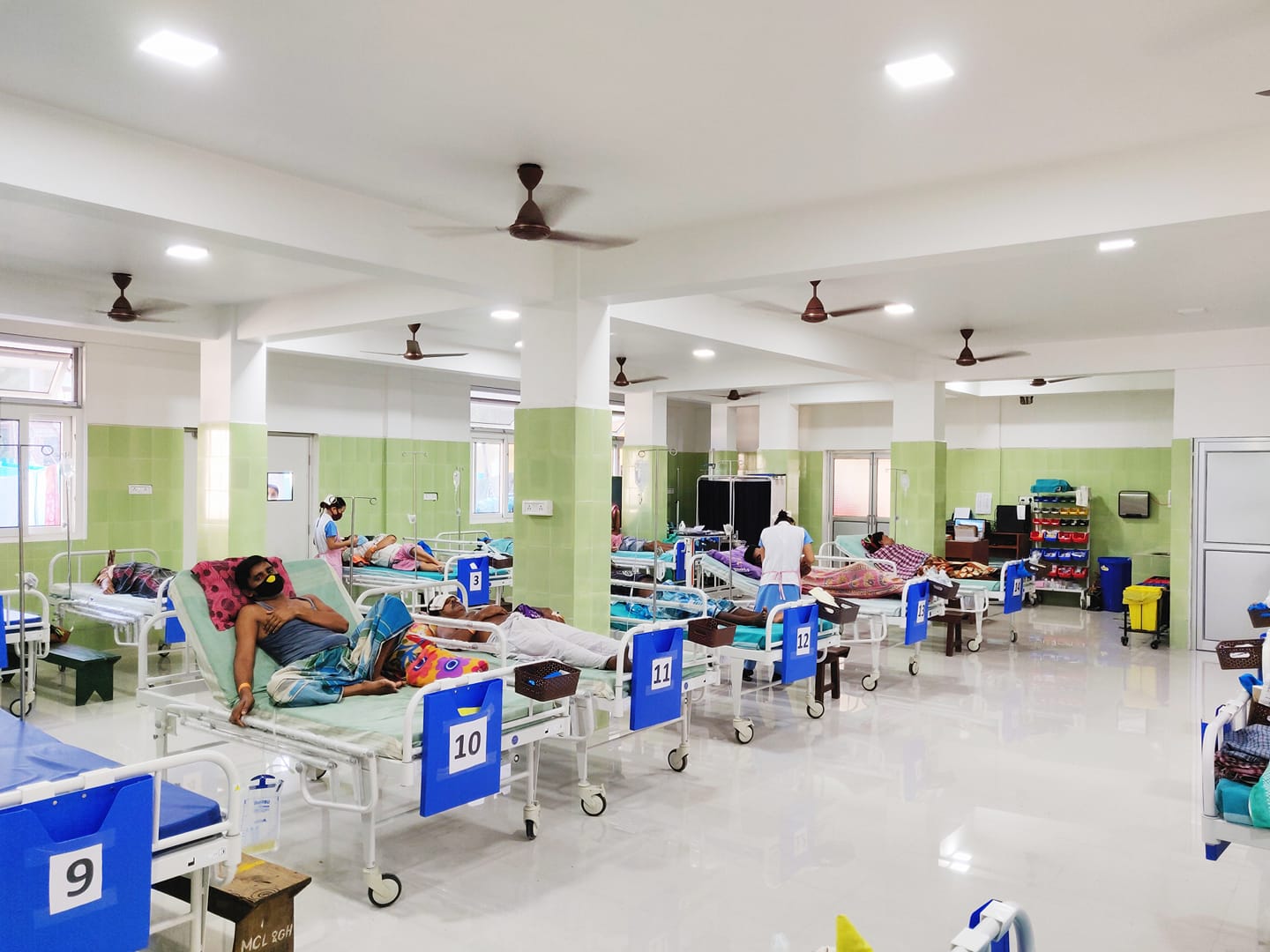
Baby Receives Life-Saving Surgery at Makunda
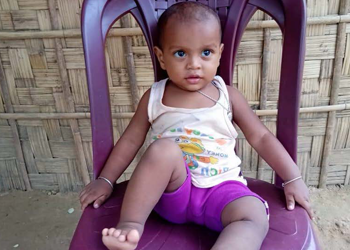
Ansh, a healthy baby boy, was born in August 2020 to parents Ashu and Kalpana. Ashu is a farm laborer earning 600 rupees ($8) a week, barely enough to feed his family.
When Ansh was a month old, he received his scheduled hepatitis B injection. After nine days, his family noticed swelling at the injection site and took the baby to the local government hospital. The doctors found an injection abscess that required immediate surgery, and Ansh was referred to a private hospital. The estimate for the surgery was 20,000 rupees ($267), so in desperation, the family sold their land for 10,000 rupees. They spent nine days in the hospital and used up all their money without Ansh even receiving the needed surgery.
One of their neighbors suggested the parents take Ansh to Makunda Christian Hospital where he might receive the medical care he needed. Even though the pandemic was limiting travel and they were out of money, they courageously set out for Makunda.
When they arrived, they breathed a sigh of relief that their baby was in the hands of experienced doctors and nurses who would operate on Ansh’s abscess and provide the necessary intensive care. After 15 days in the hospital, Ansh was ready to be discharged, and he was sent home with a month’s worth of antibiotics. Ansh’s total medical bill was 33,000 rupees ($440), which was completely covered by the hospital and the Ekam Foundation.
Ashu and Kalpana were able to take home their healthy baby. Ansh is now a symbol of hope that in these difficult times, there are still people who care and who help others. Although the couple went back to their old lives of difficult work, the love and support they received from the Makunda Christian Hospital staff at just the right time brings them joy.
Impaled by Bamboo
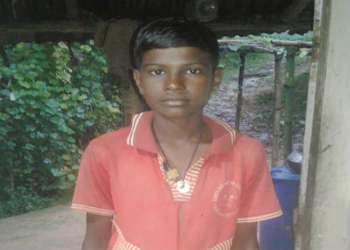
Ashok is a 12-year-old young man who loves to play football in his free time. His father and two other family members are tea plantation workers earning $3 a day each, with which they support a family of 12.
During one football game, Ashok fell and hit his abdomen on a bamboo stump. Not wanting to get into trouble, he kept quiet about it. But his parents noticed his unusual lethargy and his swollen stomach. They rushed him to Makunda Christian Hospital, where they learned that Ashok needed surgery.
A team including a surgeon, pediatric surgeon, and pediatrician operated on Ashok and found a perforation in his small intestine. Following the surgery, he experienced kidney issues with septic shock and had to be put on a ventilator. His progress was slow and steady, and after an entire month in the hospital, he was released.
Anticipating a large medical bill, Ashok’s family took a high-interest loan of $40 from a village lender. After evaluating the family’s ability to pay, Makunda staff covered his entire bill with help from the Ekam Foundation. Ashok’s family was thrilled for this generous gift which allowed them to pay back their loan, and are relieved that Ashok can continue enjoying his childhood.
Mental Health Care Changes a Life
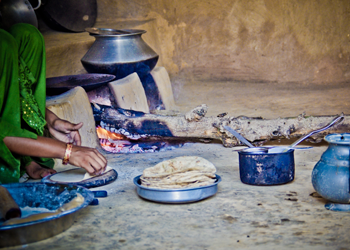
Mihika was a woman who was often seen wandering around the Makunda Christian Hospital (MCH) campus. She was alone and seemed directionless. MCH staff befriended her and brought her in for an evaluation. Mihika was diagnosed with schizophrenia, a chronic and debilitating mental illness, and was given antipsychotic medication.
After three months, Mihika improved dramatically and began coming in on her own to receive care at MCH’s psychiatric outpatient department. Seeing her improvement, many in her village began accessing psychiatric care. Mihika’s family members took her back to live with them, and she is able to contribute to household tasks such as meal preparation. MCH staff praise God for His healing and for opening up the doors for community psychiatry in and around Makunda.
Infant Treated for Severe Jaundice
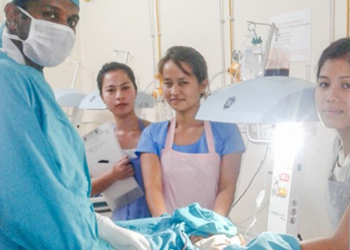
Farida, a young woman poised to enter motherhood, arrived at Makunda Christian Hospital ready to deliver. Everything went well, and six days later the family was ready to be discharged.
Before they could leave, the baby developed a severe case of jaundice. Even the infant’s palms and the soles of her feet were a deep yellow color. Her bilirubin levels had skyrocketed to 38.7 mg/dl (normal is around 1, and phototherapy is started for infants with levels above 5). The infant was in danger of serious complications if the staff couldn’t get her levels down. The doctors started her on intensive double-surface phototherapy. After six hours there was still no significant drop in bilirubin.
The Makunda staff did not have many other options to try, so they recommended that the couple take their baby to a more advanced medical facility. But the parents were unwilling to leave Makunda, so the doctors and nurses determined to perform a double-volume exchange transfusion. Thankfully, they had a spare pint of the right blood type available, but the umbilical venous catheterization was not easy since the baby was only six days old. Assisted by two nurses who had just graduated from school, the doctors finally completed the transfusion.
Everyone sighed in relief to see the post-transfusion bilirubin levels drop to 23 and then to 17 after continued phototherapy. The baby continued to be active with no signs of distress. Eventually, the infant was healthy enough to be released, and Farida and her husband were thrilled to take her home. The teamwork and intensive care given to this baby by the Makunda staff are a wonderful example of the care that EHA provides.
Burn Victim Restored to Family Life
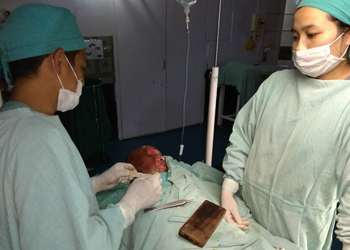
Thirty-year-old Babli was cooking when she experienced a seizure, and as a result, hot curry fell on the right side of her face. Her husband found her, unconscious and unresponsive, and suffering from third-degree burns. She was also 8 months pregnant with their fifth child.
He rushed Babli to Makunda Christian Hospital and the doctors immediately induced labor and delivered a preterm baby boy. Next they considered what to do regarding her facial burns. There is no plastic surgeon at Makunda, so the staff encouraged Babli’s husband to take her to a more advanced mecical facility that would have the specialists she would need for her care.
But it soon became apparent to the medical staff that as a daily wage laborer, her husband was not in a financial position to take her anywhere else. The doctors dressed her burns and monitored them carefully. After several days had passed, her wound had improved significantly and was ready for a skin graft. With no expertise in facial skin grafting, the doctors were hesitant but they knew that they must proceed to the best of their ability or risk infection, while trusting God to guide them. So with much prayer and faith, they conducted a three-hour surgery, grafting skin from her thigh to her face.
After three days, they checked the graft and were relieved to see it healing well. Everyone was thrilled to know that Babli would be able to go home and care for her young children due to the grace of God and the skill and care of the Makunda medical staff.
Caring for the Littlest Ones
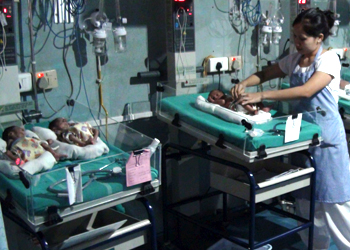
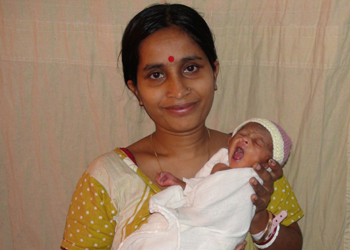
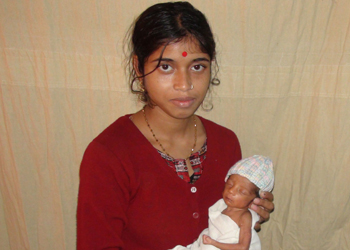
Despite the fact that EHA’s Makunda Christian Hospital currently only has 8 infant beds, the staff there deliver almost 5,000 babies each year. That’s about 14 babies a day! The facility at Makunda has become a referral center for high-risk obstetric care, and the staff there are grateful to God for the opportunity to take care of high-risk neonates (babies in their first month of life), both those born in the hospital and those referred from other facilities. Gifted nurses provide the backbone of the infant care, and their commitment has been instrumental in increasing Makunda’s services to meet the ever-growing need.
Pompa Das’ baby was born 32 weeks early and weighed only 3 pounds. In many places in India, this would be a death sentence, with nowhere to take the infant for neonatal care. Another mother, Rupali Malakar, also delivered her infant at 32 weeks and was referred to Makunda for their expertise. Both of these babies had an uneventful three-week stay in Makunda’s nursery, and both families were counseled as to the best way to care for their premature infants. After this time in the hospital, the babies were developed enough to go home and mature on their own.
The need for neonatal care in India is staggering; of the 26 million babies born each year in India, almost 1 million die in their first month of life. Most of these deaths are preventable, so infant nursery care is vital. At Makunda, the rough construction of an 18-bed NICU has already been completed, thanks to generous donors. Now they just need to purchase equipment such as infant warmers, phototherapy units, and monitors in order to be ready to care for more of these tiny patients. If you feel led to give toward meeting this need, please visit our website to donate.
The Reality of Rural Healthcare
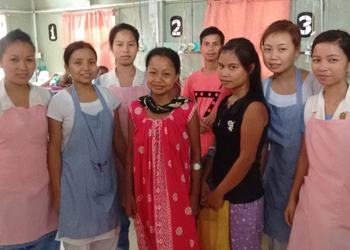
Brought into Makunda Christian Hospital, Maya, aged 32, was in her fifth pregnancy. Only two of her children had survived. Maya came to the hospital days later than she should have because of the practical and financial difficulties of travel for the poor. She was known to be part of the Reang Community, an internally displaced tribal population living as refugees in modern-day India.
When she arrived, Maya was unconscious and experiencing seizures. The parts of her brain that process stimuli were functioning poorly. She was diagnosed with eclampsia. When the doctors examined Maya, they realized that her baby had already died. Saddened by this news but determined to save her life, the doctors hooked Maya up to mechanical invasive ventilation. Not every EHA hospital has this equipment, but thankfully Makunda does. Soon they delivered the baby and Maya was weaned off the ventilator. After her recovery, she was released with no neurological aftereffects.
Eclampsia, a condition that causes seizures, affects pregnant women around the world. Estimates range from five to ten percent of all pregnancies globally. In the United States, with our advanced healthcare, only three to five percent of women are affected by eclampsia, but it is estimated to cause 40 to 60 percent of all maternal deaths in developing countries.
In India, the management of eclampsia has been revolutionized with the use of magnesium sulfate. But the reality in rural India has been that despite the advances in medicine, access to a health service facility which is affordable to the poor and that strives to deliver high quality services is often a distant dream. EHA is working to make that dream a reality at all 20 of their hospitals.
The medical staff at Makunda was grateful to God for the equipment available at their location to be able to mechanically ventilate Maya and for granting the health team the skills to manage a ventilated patient. Through saving Maya’s life, the staff had an opportunity to see how God touches the lives of the needy through the work at Makunda.
Glad to Be Alive!
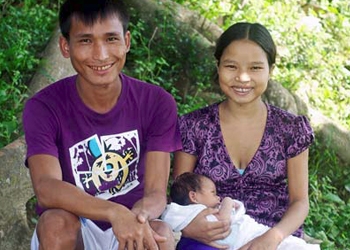
She came to EHA from a refugee camp in the neighboring state of Tripura. Twenty-four-year-old Kamirung Reang and her husband are internally displaced people who are landless, having been pushed out of Mizoram and into a refugee camp where they have scraped out a living for ten years. Needless to say, they are not wealthy. Many Indian women in her situation would have stayed at home to deliver their babies — and died. Too many Indian women die in childbirth, either because they refuse to go to a hospital, are not allowed to go by their families, or are too poor to go. Many who do go to a hospital must sell all they have — house, land, and livestock.
Kamirung had two previous Cesarian sections and she knew her labor wasn’t progressing well this time either. Her only option for help was to travel 55 miles to Makunda Christian Hospital — with the first part of the journey accomplished by carrying her on a hammock to the road. They reached Makunda late at night and emergency surgery was performed. If she had been delayed any longer, she likely would have died and lost her baby as well.
She was able to come to Makunda because they strive to provide quality treatment at a cost poor patients can afford. They provide charity to the poorest patients, including food and lodging, so that they can still be treated. Maternal and child health are a priority since these are healthy patients who have a good chance of a long life if prompt treatment can save them. Thank God for the good people at Makunda who reach out and help patients like Kamirung.
A Tiny Girl Finds Relief Through Surgery
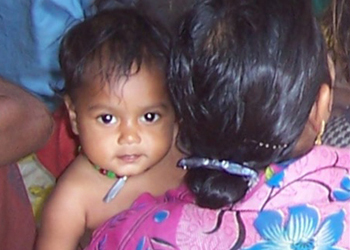
She swallowed a piece of jewelry and it was sharp! The two-year-old girl came to Makunda Christian Hospital struggling with breathlessness. She had been playing with her mother’s jewelry, and the x-ray showed that the piece was lodged in the right bronchus.
Makunda’s doctors advised the mother to travel to a different hospital because their bronchoscope forceps were broken, but she explained she was a single mother with no means of traveling. When the doctor did the bronchoscopy, the pin was removed on the first attempt.
Amazed, the doctors looked to see what had caused the removal to go so smoothly. In fact, there were two depressions on either side of the pin, and the jaws of the forceps had fit exactly into these holes so that it was firmly held. This was God’s hand on the surgeon—when we are vulnerable, He provides.
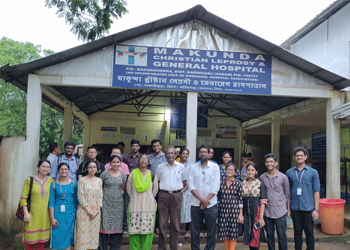
About Makunda Christian Hospital
Makunda Christian Hospital was begun in 1935 by Dr. Crozier as Makunda Christian Leprosy and General Hospital. He began medical work at that time with the poor in Alipur, and the focus of the hospital today remains serving the poor. Makunda Christian Hospital is located in a tribal-populated area at the junction of three northeast states—Assam, Mizoram, and Tripura.
There are no other quality hospitals located in these areas, so Makunda is the main provider of healthcare for this region. The service priorities of the hospital include surgery and pediatric surgery, obstetrics and gynecology, pediatrics, anesthesia, and dentistry.
Also focusing on offering training programs for health professionals, Makunda has a strong impact on areas such as maternal and child health in these rural areas. The ANM nursing school trains local women in healthcare techniques, and they then return to their villages and help care for the women and children. They offer health education on all the major diseases, including tuberculosis, HIV, leprosy, as well as on immunizations.
The spiritual side of Makunda Christian Hospital is evident in the prayer rounds that occur in the wards, the chapel services, the staff retreats, and the studies offered in the school as well as the Nursing School hostels.
It was long a dream of Makunda to operate a Christian school, and it has become a reality. They started out with about 200 students, and currently 645 children attend the school. They provide a quality education to children from poor tribal areas of the northeast area of Asam. This education will pave the way for transformation for these children and their families. The long-term vision is to see the community changed by impacting future generations. The school also provides a ready means to share about God with the students and their families.
